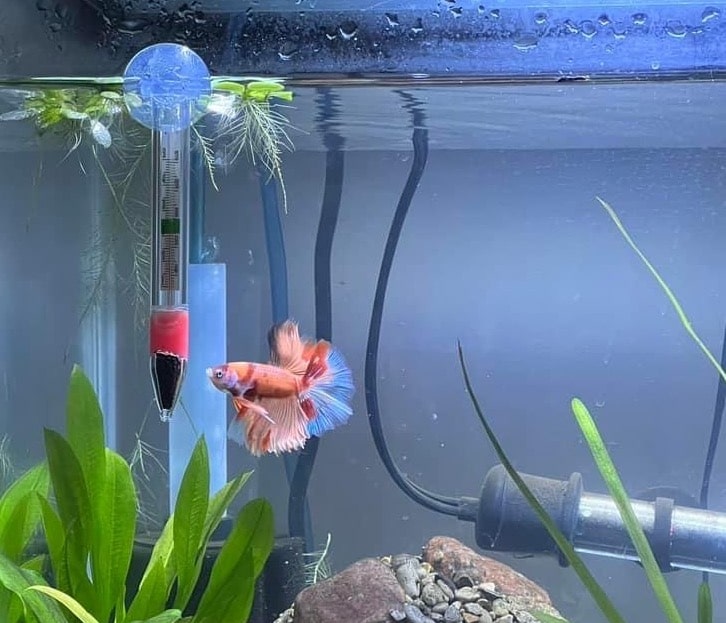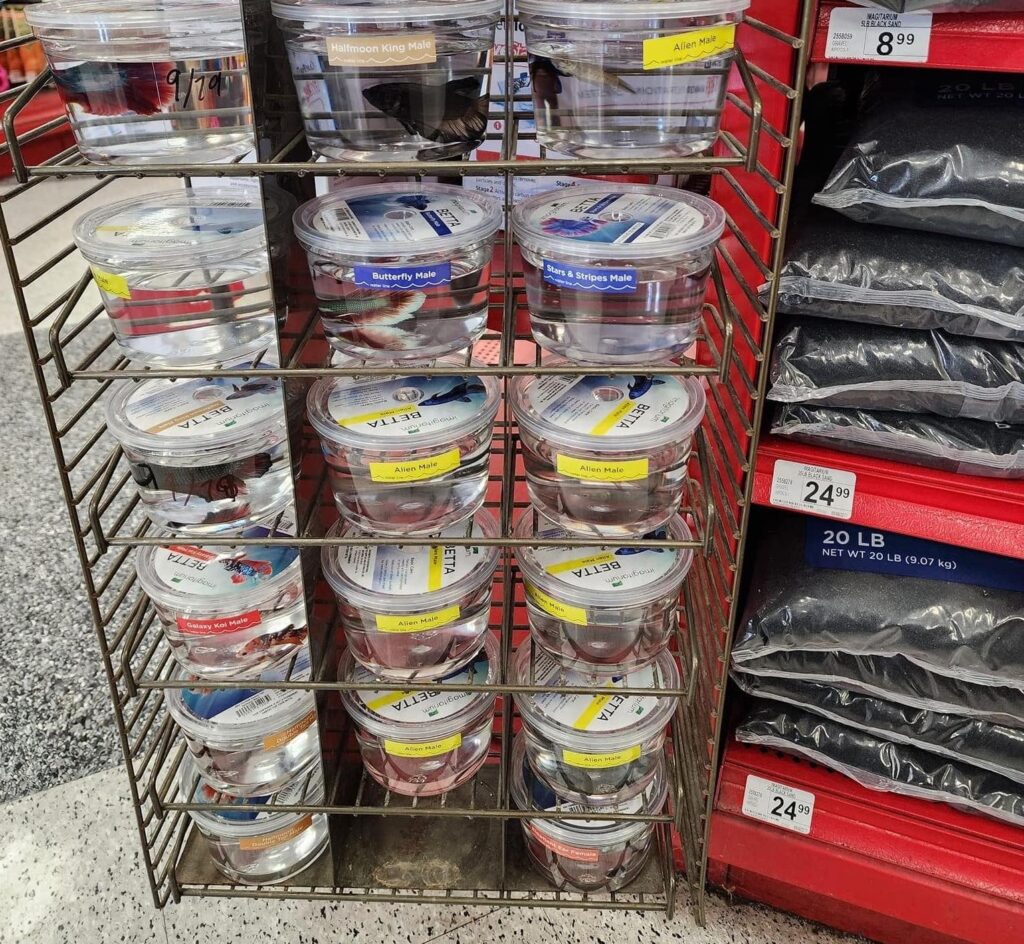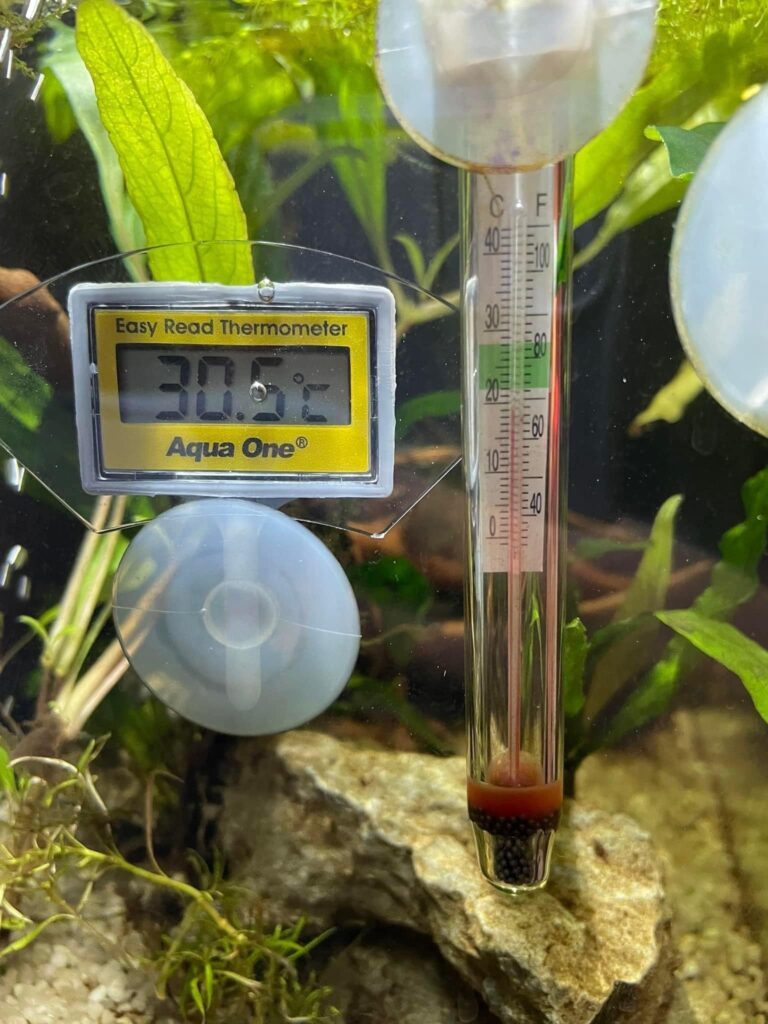Betta fish are popular among beginners as they are relatively easy to keep, but they require specific conditions to thrive. One critical aspect is maintaining the right temperature.
Bettas are tropical fish, native to the warm waters of Thailand, Laos, Cambodia, and other Southeast Asian countries. As cold-blooded ectotherms, they can’t regulate their own body temperature and rely on water temperature to maintain their internal temperature.
If the water temperature is too high, your Betta fish may overheat and struggle to breathe. If the water temperature is too cold, your fish will become sluggish, and its immune system may weaken, making it more susceptible to diseases.
However, finding and maintaining the optimal temperature for your Betta fish is easy with the help of this Betta fish temperature guide. Keep reading to find out what the ideal water temperature is for your Betta fish and how to adjust the temperature if needed.

What’s the Ideal Temperature for Betta Fish?
The ideal water temperature range for Betta is between 75°F to 80°F (23.9°C to 26.7°C). Within this range, Betta splendens can thrive, enjoy their food, rest comfortably, and actively swim around.
What’s the Lowest Temperature Betta Can Survive?
Betta fish can survive in water temperatures as low as 70°F (21.1°C), but they become uncomfortable when the temperature drops below 75°F (23.8°C).
A temperature lower than 70°F (21.1°C) can cause significant stress to Bettas, making them inactive and more susceptible to diseases, which can ultimately lead to death. Cold conditions slow down Bettas’ metabolism, which affects their appetite, energy conversion, and immune system.
What’s the Highest Temperature a Betta Can Tolerate?
The maximum water temperature that Betta fish can tolerate is 85°F (29.4°C). Water temperatures above 85°F (29.4°C) can increase a Betta’s metabolic rate, leading to a shorter lifespan. Additionally, high temperatures decrease the oxygen concentration in the water, causing discomfort and breathing difficulties for Bettas.
Can Betta Fish Survive in Room Temperature?
The ability of Betta fish to survive at room temperature depends on the region they live in. In tropical areas like Thailand, Cambodia, Laos, and Vietnam, where the room temperature ranges from 79°F to 81.5°F (26.12°C to 27.5°C), Betta fish may thrive. However, in regions such as North America, where the average room temperature is around 68-76°F (20-24.4°C), Bettas may struggle as this is lower than their minimum temperature requirement.
Pet Store Bettas
Pet stores usually keep Bettas in small, unheated bowls instead of allocating the recommended 5-gallon aquarium space per fish. While these Bettas may appear healthy, they are barely surviving and far from their best health.
Since the water volume in these bowls is low, they are highly sensitive to changes in climate. Sudden temperature variations can make Bettas very uncomfortable and trigger thermal shocks, which eventually lead to diseases. This increases their risk factor for conditions such as ich, fin fungus, clamped fins, excess mucus, and inactivity.

Comparison of Temperature Preferences for Different Betta Fish Species
Bettas generally prefer the similar optimal temperatures, with the most common species, Betta splendens, thriving in temperatures between 75-80°F (24-27°C). However, different Betta fish species have slightly different temperature preferences. For instance, Betta Imbellis, also known as the peaceful Betta, prefer cooler temperatures, around 68-82.4°F (20-29°C).
Selective breeding has created unique Betta splendens types like Crowntails and Rosetails with elegant fin types. However, selective breeding can lead to weakened fish with compromised immune systems, which can be further damaged by low water temperatures. Hence, maintaining rare and fragile breeds at slightly increased water temperatures could help keep them healthy.
Factors Affecting Betta Fish Water Temperature
Ambient Temperature and Seasonal Changes
Even in regions where the ambient temperature is suitable for Bettas, natural temperature fluctuations between day and night and seasonal changes can cause temperature instability, which can affect Betta’s health. To ensure the well-being of Betta fish, it’s essential to maintain a stable temperature within the optimal range that may not be naturally available.
Heating Equipment and Thermostat Settings
If your aquarium heater malfunctions, it can cause a sudden temperature change in your aquarium, which can be harmful to your Betta fish. While aquarium heaters are designed to maintain a consistent temperature, like any electronic device, they can encounter problems. For instance, the thermostat may fail, resulting in water being overheated or not heated enough.
Tank Size and Location
Tank size and location are also important factors that can affect water temperature. Smaller fish tanks are more vulnerable to fluctuations in air temperature, and without an aquarium heater, the water temperature in a small tank can change drastically.
Even if you’ve got an aquarium heater, it’s important to find a stable location in your home. Avoid placing the Betta fish tank near direct sunlight, radiators, and air conditioning units. Direct sunlight can also cause algae bloom in your tank.
Other Environmental Factors
To keep the temperature stable in aquarium, choose a source of lighting that doesn’t give off too much heat. LED lighting runs coolest and won’t heat up your fish tank.
Do Betta Fish Need an Aquarium Heater?
Yes, Betta fish need an aquarium heater. To keep Betta fish healthy and comfortable, it’s important to maintain their water temperature within a specific range. While Bettas can survive in temperatures that are suitable for humans, fluctuations can still occur throughout the day and across seasons. That’s why it’s recommended to use a heater in your Betta tank, even if the ambient temperature seems appropriate.
An aquarium heater ensures that the water temperature remains stable and within the ideal range for your Betta, and it includes a thermostat that turns the heater on and off as needed to maintain the desired temperature.
Choosing the Right Aquarium Heater for Betta Fish
When it comes to choosing a heater for your Betta fish, there are a few things to consider. Adjustable aquarium heaters are the most versatile option, as they allow you to select and maintain a specific temperature for your Betta. This can be particularly useful if you’re breeding Betta or treating for Swim Bladder Disease, where a slightly elevated temperature may be needed.
Alternatively, you can opt for a preset aquarium heater that’s calibrated to a safe temperature for Betta fish. Most tropical fish heaters are fixed at 78°F (25.5°C). Like adjustable aquarium heaters, preset ones also include a thermostat to maintain the desired temperature, but you won’t be able to adjust it.
Safety is another important consideration. Look for aquarium heaters with shatterproof and shockproof materials to prevent them from breaking or posing a danger to your Bettas. A protective casing can also be helpful in keeping your fish from coming into contact with the heating filament.

Heater Power and Placement
A good rule of thumb is to have an aquarium heater with an output of 3-5 watts per gallon of water, with 5 watts preferred for colder regions. For a 10-gallon tank, you’ll need a heater with 30-50 watts of power.
However, using a single aquarium heater can lead to uneven heating, causing temperature shock for your Betta fish. To avoid this, consider using two aquarium heaters, each with a lower wattage, and placing them on opposite sides of the tank. For example, two 15W heaters can provide a total output of 30W and ensure even heating throughout the aquarium.
Risks of Sudden Temperature Changes for Betta Fish
Betta fish are susceptible to temperature shock caused by rapid changes in water temperature. Such changes can disrupt the internal temperature of the fish, resulting in difficulties with swimming and breathing (1). Additionally, it can affect the metabolic rate and proper functioning of internal organs, ultimately leading to death. To avoid this, it’s essential to make gradual adjustments to the water temperature, even when it falls outside the optimal range.
Temperature shock has been observed in various fish species due to both cold shock and heat shock. The most common symptom of temperature shock is rapid gill movement, indicating that the fish is struggling to breathe.
Betta Water Temperature and Breeding
The ideal water temperature for Betta fish is typically between 75°F to 80°F (23.9°C to 26.7°C). However, temperature also plays a role in behavior and breeding. Researchers from Comparative Medicine have found that a temperature of 82.4°F (28°C) is optimal for bubble nest building conditions. Lower temperatures ranging from 73.4°F to 77°F (23°C to 25°C) can lead to the birth of more female Betta fish. On the other hand, temperatures over 91.4°F (33°C) can result in higher male Betta fish populations but harm larval mortality.
Water temperature can also be used as a treatment for parasite infestations. For instance, maintaining a water temperature of 86°F (30°C) for ten days can prevent Ichthyophthirius multifiliis, commonly known as Ich, from reproducing, thereby resolving the problem.
While treating parasite infestations, it’s essential to monitor your Betta fish closely during the period of increased water temperature to avoid any adverse effects.
Temperature Checks and Monitoring Routines
It’s crucial to monitor your Betta fish tank’s water temperature daily to ensure their optimal health. Heaters and thermostats can malfunction, so regular temperature checks are necessary.
You can use a stick-on thermometer inside the tank or a submerged digital thermometer to measure the temperature. Digital thermometers are easier to read than traditional mercury thermometers, but they may become inaccurate when the battery is low.

Symptoms of Betta Fish Being Exposed to Incorrect Water Temperature
Signs Water Temperature is Too Low
Lethargic Behavior
When the water temperature drops, Bettas conserve energy by limiting their movement. If you find your Betta fish dull and lethargic or spending most of its time at the bottom of the tank, it could be due to abnormally cold temperatures.
Slowed Gill Movement
When the water is too cold, your fish’s gill movement will slow down and he won’t move his fins around as much.
Staying Close to Heater
Bettas will try finding warmth near the heater when the fish tank water is chilly. The heater might have malfunctioned or the set temperature is inappropriate.
Increased Sickness and Disease
If your Betta is getting sick more often, it could be due to inadequate water temperature. You can apply relevant cures but also try increasing the temperature of the tank to boost their immune system.
Signs Water Temperature is Too High
Hyperactive Energy
When the water in the fish tank is too warm, your Betta might become hyperactive and swim erratically, tiring itself out and requiring more oxygen. Warm water contains less dissolved oxygen, which can be dangerous for your Betta.
Bumping into the Tank
Your Betta may glide along the aquarium walls, bumping his nose. This is known as glass surfing, and it usually occurs when the water is too hot.
Gasping at the Surface
Gasping at the surface is a sign of low oxygen levels in the water, which can be caused by warm temperatures. Bettas need sufficient dissolved oxygen to breathe underwater, so if you notice your fish spending more time at the surface than usual, it could indicate that the water temperature is too high.
What to Do If the Heater Malfunctions?
If you notice an alarming temperature change in your fish tank, you can take a few steps to restore it to safer levels.
When the Water Gets Too Hot
If the water in your Betta’s tank gets too hot, there are a few steps you can take to cool it down and restore it to safer levels:
- Remove the tank cover and place a fan near the tank to circulate air over the surface of the water. You may also need to remove some of the water to prevent your fish from jumping out of the tank.
- Turn off the aquarium light for a few hours, as it can add extra heat to the water.
- Replace 5-10% of the water with cooler water, making sure to add it gradually to avoid stressing your fish.
- Place a bag of ice cubes in the tank to absorb some of the water’s heat and cool it down.
- Use a water aerator to cool down the water by introducing fresh air, which also helps maintain oxygen levels in the tank.
When the Water Gets Too Cold
When the water in Betta’s tank too cold, you can take the following considerations to restore the water to its safer levels:
- Use a warm towel to insulate the fish tank and increase the water temperature.
- Position the fish tank in direct sunlight to allow the heat from the sun to warm up the water.
- Place a clean plastic bottle filled with hot water inside the tank to increase the water temperature through heat exchange.
- Replace 5-10% of the water with hot (not boiling) conditioned water, adding it gradually and away from the fish to avoid harming them.
Conclusion
Betta fish require warm temperatures to thrive, so it’s important to maintain their tank temperature in the ideal range of 75-80°F. It’s recommended to check the water temperature daily and observe your Betta fish for any signs of discomfort with the temperature.
By keeping track of all the parameters, you can ensure that your Betta is happy and stress-free. Maintaining the optimal temperature for your Betta is crucial as it helps them to relax, similar to how a warm bath can help you unwind.